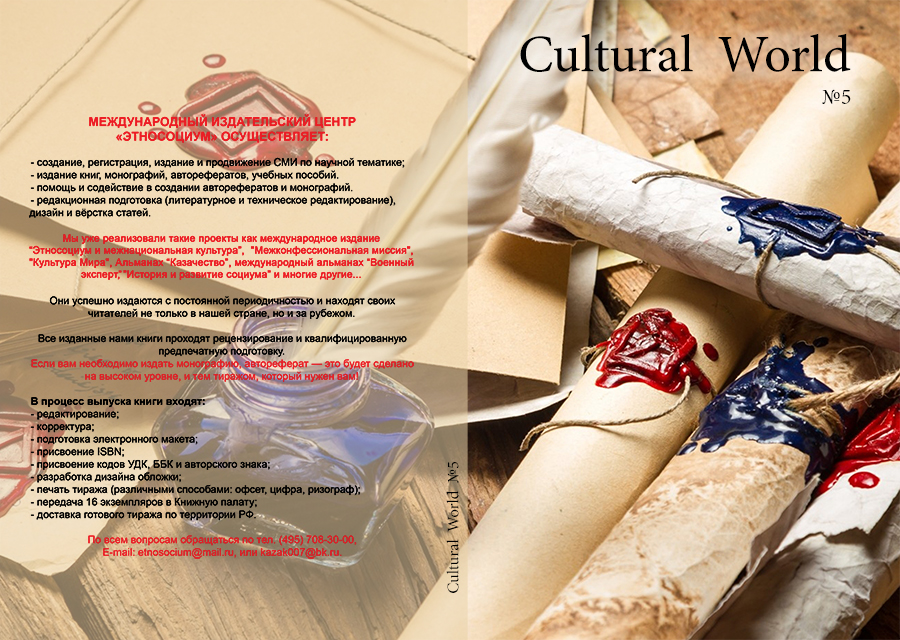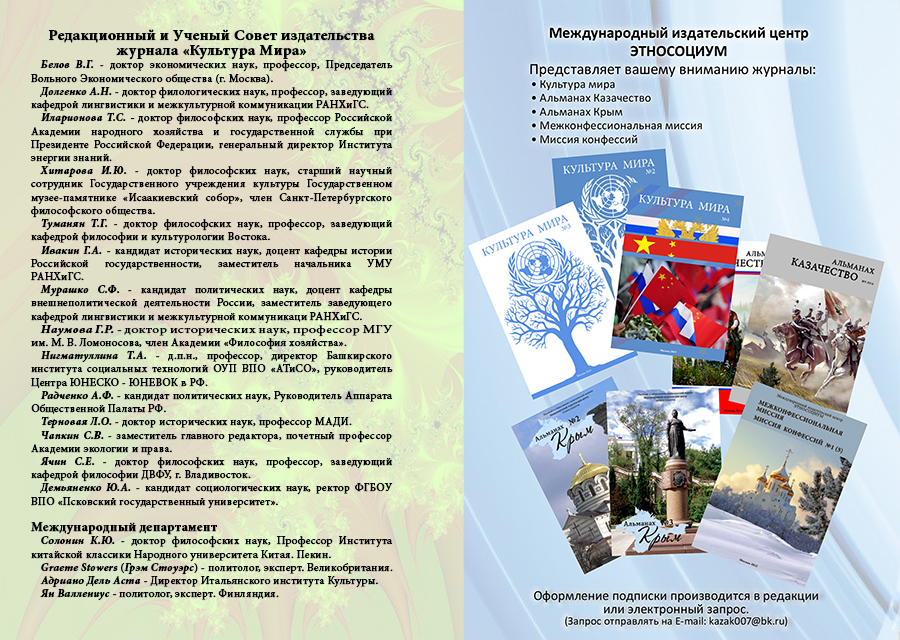
Cultural World №5
Ryabova E.L., Chief Editor, Doctor of Political Sciences, Professor.
The Council of Reviewers of the publishing house together with the teaching staff of leading universities:
The main criteria of our choosing materials for publishing is their high scientific level. The main principle of the publishing house is to accept pluralism of views if authors present their points of view in a well-argued manner. The author’s view point does not have to coincide with the editors’ view points.
The authors of submitted materials are responsible for the accuracy of facts, quotations, dates, events, geographical and proper names.
If you use any materials from the journal, you are to give a relevant reference to it.
All the submitted materials are reviewed.
Journal's Editorial Board
Belov V.G., Doctor of economic sciences, Professor, Chairman of the Free Economic Society (Moscow).
Dolgenko A.N., Doctor of philological sciences, Professor, Head of the Department of Linguistics and Intercultural Communication of the Russian Presidential Academy of National Economy and Public Administration.
Ivakin G.A., Candidate of historical sciences, Associate Professor of Russian History,Deputy Head of the UMU of the Russian Presidential Academy of National Economy and Public Administration.
Murashko S.F., Candidate of political sciences, Associate Professor of Russia's foreign policy, Deputy Head of the Department of Linguistics and Intercultural Communication of the Russian Presidential Academy of National Economy and Public Administration.
Naumova G.R., Doctor of historical sciences, Professor of the Lomonosov Moscow State University, Member of the Academy "Philosophy of Economy".
Nigmatullina T.A., Professor, Director of the Bashkir Institute of Social Technologies PMO VPO of the Academy of Labor and Social Relations, Head of UNESCO Centre in Russia.
Radchenko A.F., Candidate of political sciences, Chief of Staff of the Public Chamber of the Russian Federation.
Ternovaya L.O., Doctor of historical Sciences, Professor of the Moscow Automobile and Road Construction University.
Chapkin S.V., Deputy Chief Editor, Honorary Professor of the Academy of Ecology and Law.
Yachin S.E., Doctor of philosophical sciences, Professor, Head of the Department of Philosophy FEFU, (Vladivostok).
Demyanenko Y.A., Candidate of sociological sciences, Rector of VPO Pskov State University.
International Department
Graeme Stowers, political expert (United Kingdom).
Adriano Del Asta, Director of the Italian Cultural Institute.
Yan Vallenius, political expert. (Finland).
Contents
|
International Relations
|
|
|
Ternovaya L.O., Bagaeva A.V. The Visualization of the image of Europe in the cultural space of the European Union
|
4
|
|
Orlova M.M. Student culture or student subcultures?
|
15
|
|
Donskaya V.N. Leadership and Motivation in Human Resources Management
|
25
|
|
Ananchenkova P.I., Mustaeva N.G. Corporate Culture of Employees: Formation and Development on the Basis of Distance Learning Technologies
|
36 |
|
Human Rights
|
|
|
Кim F.S. European Spiritual Heritage (an opinion of an «enlightened conservator»)
|
45
|
|
Fedorushkova O.S. The Problem of Social Justice in Modern Theories of Liberalism and Libertarianism
|
53
|
|
Lyannoi V.A., Ponomareva A.I. Cultural and Social Adaptation of Labor Migrants in the Host Community: Why Study the National Language?
|
65
|
|
National Culture and Art
|
|
|
Kalmykova M.V. Basic products and dishes in the Italian nourishment
|
74
|
|
In Jui Influence of Soviet cultural works (films, literature and music) on the Chinese Society in the 1949-1956
|
82
|
|
Toliatti
|
|
|
Let's Read Petrarch, Dante, Boccaccio
|
89
|
|
Abstracts
|
93
|
|
Authors
|
96
|
Abstracts
Ternovaya L.O.
Bagaeva A.V.
Visualization of the Image of Europe in the Cultural Background of the EU
The article is dedicated to the usage of visual images of Europe and European symbols as means for public support of European integration. The authors apply the method of synthesis summarizing the mythological and cultural background knowledge of the notion “Europe”, which is used for understanding modern European symbols.
It is concluded that if famous cultural images lie at the root of not only cultural traditions, but also political and geopolitical ones, then they require a constant conceptual filling. The authors give examples of measures undertaken for creating united European symbols: programs of putting forward ecological and cultural capitals, creating new museum types, which promotes the development of the continent as a cultural center.
Keywords: Europe, European Union, visualization of images, the cultural capital, the museum space.
Orlova M.M.
Student culture or student subcultures?
In the article, the author emphasizes that studentship is not only time for the development of new knowledge and preparing for one’s professional life. It is also time of active absorption of norms, values, samples of national and world culture. Students themselves create a special cultural space, which serves the consumer and the producer of cultural product. Students actively process what has been established in culture by older generations and created by youth subcultures. In the research, the author summarizes the basic conclusions and ideas drawn by foreign (Mannheim, Trow, Newcomb) and Russian (Lotman, Izgoev, Lyasnikov, Lyasnikova, etc.) scientists on the subject of studentship and students' culture. What's more, the author highlights the importance of presentation of students' works on organized platforms, festivals, clubs designed specially for this purpose.
Keywords: higher education, universities, student culture, subcultures, political socialization.
Donskaya V.N.
Leadership and Motivation in Human Resources Management
The background of this work is comprised by means of works of XX century scientists. In the article the author analyses theories of leadership and the types of leadership styles. A special attention is drawn to leadership in business environment, especially in the HP-sphere. The author emphasizes that although charismatic leaders can still be required in some situations, the society requires more often enlargement of democratic methods of management.
The author points out such qualities of a leader as skills, knowledge, beliefs, values, ethics and character as the main ones.
It is concluded that in the modern world, leadership is less and less command and control, but more changing people’s mindsets and hence altering the way they behave. Today, leaders must be able to mobilize ideas and values that energize other people.
Keywords: leadership, human resource management, motivation, organizational culture.
Ananchenkova P.I.
Mustaeva N.G.
Corporate Culture of Employees: Formation and Development on the Basis of Distance Learning Technologies
The article discusses the possibilities of distance learning technologies in the process of formation of corporate culture employees. The author presents the data of their own independent research regarding methods and challenges of distance learning in corporate educational programs.
The massive research dealt with the usage of distance learning technologies within 64 companies. In the questionnaire, 5300 people took part, including employees from branch companies, central offices and regional branches.
During the research the author put forward the following goals: to analyze the approaches to distance learning technologies in corporate learning; to analyze the goals of such learning; to point out the main thematic blocks in the learning process; to find out advantages and disadvantages of such a form of learning from the position of the company employers.
In conclusion, the author summarizes the results: distance learning technologies are considered to be efficient by 100% of the questioned employers; it is possible to use distance learning technologies in place of traditional teaching/learning without losing the quality of teaching.
Keywords: culture, corporate culture, training, distance learning technology.
Кim F.S.
European Spiritual Heritage (opinion of an «enlightened conservator»)
The report presents an analysis of research of European spiritual history conducted by the theorist of the so-called «enlightened conservatism» G.K. Kaltenbrunner. Thus, the article summarizes the basic ideas reflected in his main works. It is concluded that the European tradition for Кaltenbrunner is first of all an institution of spirit, polyphony of reflections and dialogues between educator and romance, a dogmatist and a skeptic, confident and doubting, conservative and revolutionary, an anarchist and a hierarchy supporter, from which nobody can be excluded.
Keywords: European spiritual Heritage, «Enlightened conservatism», European tradition.
Lyannoy V.A.
Ponomareva A.I.
Cultural and Social Adaptation of Labor Migrants in the Host Community: Why Study the National Language?
Considering new labor and legal initiatives accepted in 2014 by the Russian government, several changes in the position of migrants in Russia have occurred.
The article considers the questions of necessity to learn the national (in this case, Russian) language, which serves the main factor of adaptation of labor migrants in the host community. The authors speak on the peculiarities of the Russian language, goals, objectives, principles and approaches to organization of training of migrant workers.
Keywords: labor, migration, education, national language, adaptation.
Kalmykova M.V.
Basic products and dishes in the Italian nourishment
For this research the author uses cultural approach in description of the main trend in modern Italian food industry and cooking traditions.
The author observes the basic kit of products and dishes, which existed on the turn in the twentieth century in Italian nourishment. The author conducted and analysis of certain products and dishes: cheeses, pizzas, balsamic vinegar, floury and meat courses and others. It is concluded that local residents follow their food traditions and aspire to preserve their own regional identity, preferring to use mainly local production. Tourism encourages preservation and development of regional peculiarity.
Keywords: food, nutrition, Italy, cuisine, tradition, material culture, ethnology, Italian food, custom, traditional dish, Piemonte, cheese, pizza, kit of products, balsamic vinegar, pasta, Veneto.
In Jui
Influence of Soviet Cultural Works (Films, Literature and Music) on the Chinese Society in the 1949-1956
This article analyzes the impact of the works of Soviet culture (Soviet cinema, literature and music) on China during the years from 1949 to 1956. The author calls this period a “honey moon” between the two countries, when the connections were especially strong. The main research method is the method of case studies.
The focus of the study is a review of the Chinese people in the Soviet cultural works. Soviet culture bred love for it and for the Russian people in the Chinese society. This love remains today, which laid the foundation for the further development of relations between Russia and China.
Keywords: Soviet Union, China, cinema, literature, music, impact.
Authors
Ananchenkova P.I., Candidate of Economic Sciences, Candidate of Social Sciences, Associate professor, department of Economics and Management in the social sphere of the Academy of Labor and Social Relationship.
Bagaeva A.V., Candidate of Sociological Sciences, Assistant Professor, Department of Sociology of International Relations, Faculty of Sociology, Lomonosov Moscow State University.
Donskaya V.N., Graduate student of Moscow Automobile and Road Construction University (MADI).
In Jui, Graduate student Far Eastern Federal University.
Kalmykova M.V., Graduate student of the Faculty of History the Department of Ethnology of Moscow Bauman State Technology University, Deputy head of the department “Management in the hotel and restaurant business” University “Synergy”.
Кim F.S., Associate Professor. Department of Classical and Social-Economic Disciplines. Bronnitsky branch. Moscow Automobile and Road State Technical University (MADI).
Lyannoi V.A., Candidate of legal sciences, Assistant professor of economics and management in the social sphere in Academy of Labour and Social Relations (Moscow).
Mystaeva N.G., Associate Professor of Sociology, Advertising and Public Relationshi of the International Academy of Business and Management.
Orlova M.M., Moscow Automobile and Road Construction University (MADI) Senior Lecturer Department of Sociology and Management.
Ponomareva A.I., Senior Lecturer, Department of Economics and Management in the social sphere in Academy of Labour and Social Relations (Moscow).
Ternovaya L.O., Doctor of historical Sciences, Professor MADI (Moscow Automobile and Road Construction University).
Fedoryshkova O.S., Graduate student of political Science and Sociology MPGY.


